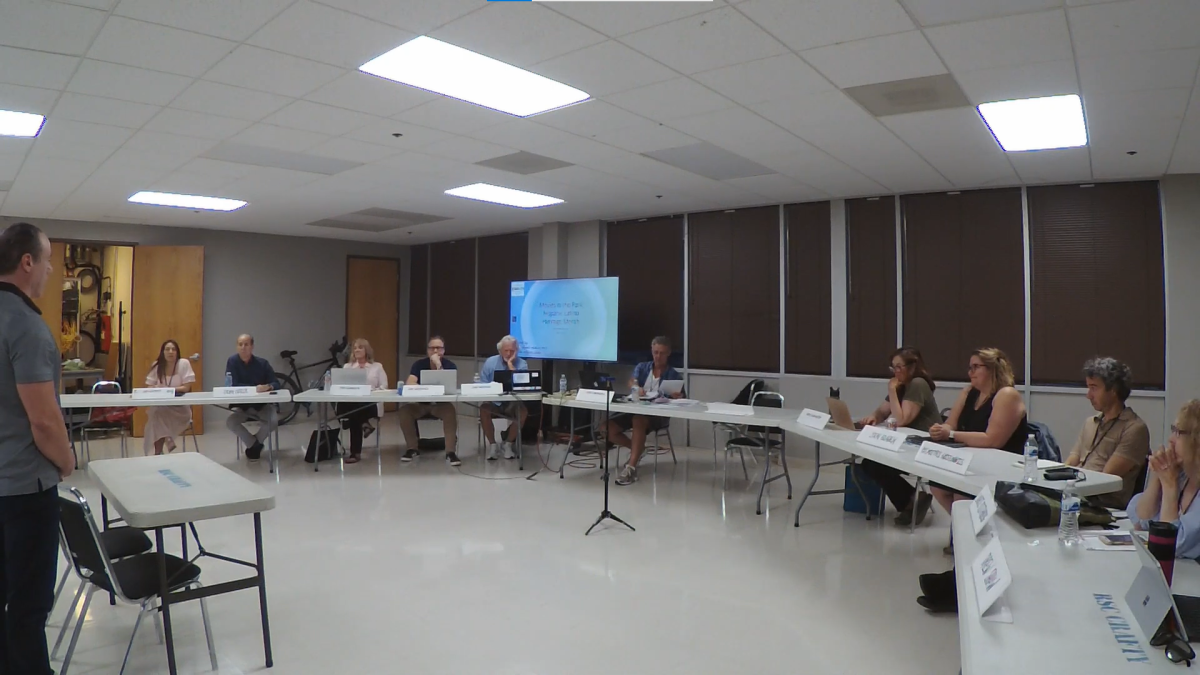Studio City Neighborhood Council members resign after appointing sex offender to panel

- Share via
Most members of the Studio City Neighborhood Council resigned last month after the group unanimously voted to appoint a convicted sex offender to fill a vacancy on their board.
All but three of the council’s 16 board seats are now vacant, according to a city official, meaning the group can no longer meet or conduct business. The elected advisory board is one of scores of neighborhood councils across the city that weigh in on local issues and provide community input.
The resignations were first reported by KTLA-TV.
At least two of the council’s members were aware of Ian Mitchell King’s 2008 conviction for sexual battery by a public official before they voted on his appointment, but said they felt confused and constrained by guidance from the Department of Neighborhood Empowerment, which oversees the neighborhood council system.
The members who were aware of King’s conviction also said they felt limited by the Brown Act, a California open meeting law that bars the majority of a legislative body from privately communicating.
Most of the council resigned within a week of the mid-August vote, as news spread about King’s past.
King did not respond to multiple requests for comment by phone and email over the past week. The address on a tax form that King provided to the neighborhood council matches the Studio City address listed in the Megan’s Law sex offender database. King was released from prison in August 2021 and remains on parole, according to the California Department of Corrections and Rehabilitation.
Is there abandoned furniture on your block? Pothole driving you nuts on your commute? Use Shape Your L.A. to learn how to get your city government to address everyday issues.
The matter surfaced Aug. 16, a few hours before a Studio City Neighborhood Council meeting, when Kim Clements, the panel’s three-time treasurer, decided to research the new members set to be appointed that night. (Representatives are typically elected to neighborhood councils. But in this case, the council was voting to approve applicants for several vacancies.)
After scanning numerous links with glowing descriptions about a candidate who she thought appeared “perfect on paper,” Clements came upon information that she said was both confusing and upsetting to her.
Could Ian King, a self-described philanthropist and business consultant, possibly be the same Ian Mitchell King who received a 20-year prison sentence for sexually assaulting a young woman while on duty as a school police officer?
Clements shared what she had found with another member of the council’s leadership. That council member, who asked for anonymity for fear of retaliation, sent an email to multiple city employees asking how the council should proceed.
Lorenzo Briceno, an assistant director of policy and government at the city’s Department of Neighborhood Empowerment, wrote back that he thought the “very sensitive matter” could be handled by either voting on the appointment as planned, or postponing it, according to an email thread reviewed by The Times.
If the neighborhood council did vote, it “would need to be extremely careful of bringing this information and possibly getting into character defamatory statements,” Briceno wrote. Or the members could postpone the item and not schedule it on future agendas — the course of action that Briceno suggested they take.
The council member responded, saying that any postponement would “open a can of worms” because he had already spoken to King about how the meeting would work and appointments to other vacant seats were also on the agenda.
“The last thing I want is to open a can of worms,” Briceno responded, saying that since there were other candidates being voted on, his “recommendation would then be to take up the item.” If any particular candidate became the topic of conversation, council members should be reminded of their code of conduct and anti-bias training, Briceno said.
If the council members ask one candidate a question, they should also ask it of other candidates “so that no candidate feels like he/she/they are being singled out,” Briceno said.
The neighborhood council member on the email thread said he was confused by the guidance and thought it felt “like a riddle.”
Ann-Marie Holman, a spokesperson for the Department of Neighborhood Empowerment, said that in situations where “an agenda item is in question, yet the full facts are not available and cannot be verified due to a short timeline,” her department recommends that neighborhood councils postpone the vote until more information can be gathered.
But, Holman said, the department “does not advise, nor direct, how a neighborhood council board votes,” nor does the department interfere with its voting processes.
If a council “insists on moving forward with an agenda item,” then the department will give guidance on complying with existing policies, she said.
At the Aug. 16 meeting, King introduced himself to the board, describing himself as a born-and-raised Studio City resident.
“I’ve been involved as a volunteer in various organizations, especially homeless organizations. And I’ve always been interested in city politics,” King told them, saying he had heard about the council vacancy and thought he would be a good fit.
During a brief question-and-answer session before the vote, another council member who had his laptop open appeared to have found the information about King online. That member asked King whether he had ever worked in law enforcement.
King, who was arrested for actions taken while working as a school police officer, told the council that he had never worked in law enforcement.
Clements, the council’s treasurer, said that answer made her doubt whether King was actually the same person and feel unsure of how to proceed without potentially discriminating against him.
She joined the rest of the board in unanimously approving King’s appointment — a decision that she says she now regrets.
News of King’s past soon began to trickle out and Clements and others said they agonized over how to proceed. Mass resignations followed within five days of the meeting.
“People were concerned for their own reputations,” Clements said, noting that she works at a family-run investment firm and wouldn’t want to be seen “rubbing elbows with a convicted sex offender.” She and others also said they weren’t comfortable being on a board with King because the neighborhood council has a youth member and routinely hosts events with children.
In the aftermath of the vote, multiple members of the all-volunteer council interviewed by The Times said they felt like they had enough training to know all the things they weren’t supposed to do, but no training to prepare them for a situation like this. Several also said they felt unsupported by the city before the mass resignations.
Holman, the Department of Neighborhood Empowerment spokesperson, said that “efforts were made to expedite a resolution to this matter, which resulted in the resignation of Ian Mitchell King from the Studio City Neighborhood Council on August 25.”
Get the lowdown on L.A. politics
Sign up for our L.A. City Hall newsletter to get weekly insights, scoops and analysis.
You may occasionally receive promotional content from the Los Angeles Times.
L.A. City Council President Paul Krekorian “believes that what happened was outrageous,” said Hugh Esten, a spokesperson for Krekorian, who represents part of Studio City. “We’re looking for a way to get the previously elected neighborhood council board members reinstated and to find a way to make sure that no situation like this ever occurs again in future.”
Esten said the former neighborhood council members had been put in an “intolerable situation” and King was “obviously unsuited” to serve on the body.
Councilmember Nithya Raman, whose district also includes part of Studio City, said she believed that “the members who resigned did so in good faith, and I support a pathway to reinstating them as a soon as possible.”
Jen Bladen, a school teacher, was one of several former neighborhood council members who expressed regret that they would no longer be able to serve the community through the council.
But, she said, she also thought the system had worked as it should, because she believes formerly incarcerated people should have the right to serve on neighborhood boards, as dictated by city rules.
“I know that’s an overly optimistic, sunny, bright way to look at it. But I really think he should have been allowed to ask to be on neighborhood council,” Bladen said. “And we should have been able to exercise our right not to be on the same council as he is on.”
More to Read
Sign up for Essential California
The most important California stories and recommendations in your inbox every morning.
You may occasionally receive promotional content from the Los Angeles Times.












